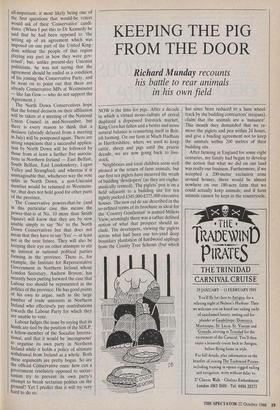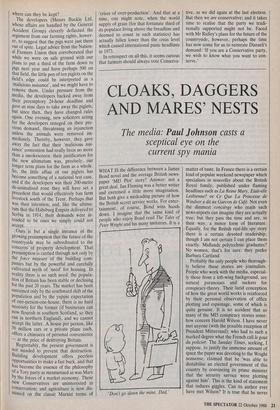KEEPING THE PIG FROM THE DOOR
Richard Munday recounts
his battle to rear animals in his own field
NOW is the time for pigs. After a decade in which a virtual mono-culture of cereal displaced a depressed livestock market, King Corn has fallen and a better and more natural balance is reasserting itself in Brit- ish farming. On our farm at Much Hadham in Hertfordshire, where we used to keep cattle, sheep and pigs until the prairie decade, we are now going back to live- stock.
Neighbours and local children seem well pleased at the return of farm animals, but our first ten piglets have incurred the wrath of building 'developers' (as they are euphe- mistically termed). The piglets' pen is on a field adjacent to a building site for ten tightly packed n45,0004375,000 executive houses. The new cul de sac described in the so-refined terms of its brochure as ideal for the 'Country Gentleman' is named Millers View; seemingly there was a rather defined notion of what that prospect should in- clude. The developers, viewing the piglets across what had been our ten-yard deep boundary plantation of hardwood saplings from the County Tree Scheme (but which has since been reduced to a bare wheel- track by the building contractors' trespass), claim that the animals are a `nuisance'. This month they demanded that we re- move the piglets and pen within 24 hours, and give a binding agreement not to keep the animals within 200 metres of their building site.
After farming in England for some eight centuries, my family had begun to develop the notion that what we did on our land was really our business. Furthermore, if we accepted a 200-metre exclusion zone around houses, there would be almost nowhere on our 180-acre farm that we could actually keep animals; and if farm animals cannot be kept in the countryside,
where can they be kept?
The developers (Messrs Buckle Ltd, whose affairs are handled by the General Accident Group) cleverly deflected the argument from our farming rights, howev- er, to suggest that the pigs were just there out of spite. Legal advice from the Nation- al Farmers Union then corroborated that while we were on safe ground with our plans to put a third of the farm down to Pigs next year and have perhaps 500 on that field, the little pen of ten piglets on the field's edge could be interpreted as a `malicious nuisance', and we might have to remove them. Under pressure from the media, the developers backed away from their peremptory 24-hour deadline and gave us nine days to take away the piglets; but since then, they have changed rules again. One evening, new solicitors acting for the developers reneged on their pre- vious demand, threatening an injunction unless the animals were removed im- mediately. Thereby, however, they gave away the fact that their 'malicious nui- sance' contention had really been no more than a smokescreen: their justification for the new ultimatum was, precisely, our longer term plans for the farm as a whole. So, the little affair of our piglets has become something of a national test case, and if the developers win their 200-metre de-animalised zone they will have set a precedent that would effectively ban farm livestock south of the Trent. Perhaps that was their intention; and, like the ultima- tum that the Habsburg Empire delivered to Serbia in 1914, their demands were in- tended to be ones we simply could not accept.
Ours is but a single instance of the growing presumption that the future of the countryside may be subordinated to the concerns of property development That presumption is carried through not only by the force majeure of the building com- panies but by the powerful and carefully cultivated myth of 'need' for housing. In reality there is no such need: the popula- tion of Britain has been stable or declining for the past 20 years. The market has been sustained only by the southward shift of the Population and by the yuppie expectation of one-person-one-house; there is• no hard necessity for the former (if businesses can now flourish in southern Scotland, so they Can in northern England), and we cannot accept the latter. A house per person, like 56 million cars or a private plane each, offers a chimaera of personal convenience — at the price of destroying Britain.
Regrettably, the present government is not minded to prevent that destruction. Building development offers peerless °Pportunities to make a fast buck, and that has become the essence of the philosophy of a Tory party as mesmerised as was Marx by the forces of a market economy. These new Conservatives are uninterested in Conservation; and agriculture is now dis- missed on the classic Marxist terms of `crises of over-production'. And that at a time, one might note, when the world supply of grain (for that fortunate third of its populace living above the breadline and deemed to count in such statistics) has actually fallen lower than the crisis level which caused international panic headlines in 1973.
In retrospect on all this, it seems curious that farmers should always vote Conserva-
tive, as we did again at the last election. But then we are conservative; and it takes time to realise that the party we tradi- tionally supported might not be. Faced with Mr Ridley's plans for the future of the countryside, however, perhaps the time has now come for us to reiterate Disraeli's demand: 'If you are a Conservative party, we wish to know what you want to con- serve.'



































































 Previous page
Previous page